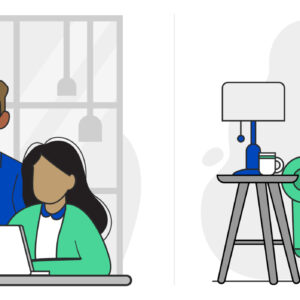Internet Safety Center
Last Updated on October 24, 2018 by Karen Quach
A resource center for parents, teachers, kids, and teens.
Having high-speed Internet is no longer a luxury in the United States, it has become a way of life. While there are certainly many wonderful things that have come from this connection, there are also serious concerns to be had about our shift away from personal interactions toward more anonymous means of communication. This is especially true for children and teens that are still learning how to interact with the world around them. The Internet Safety Center seeks to raise awareness about Internet safety and security, educating children, teens, parents, and teachers about how to protect themselves and others online.
Below you’ll find resources from government institutions, non-profit organizations, and educational centers that explain how to teach a class on Internet safety, how to use privacy settings, how to deal with cyberbullying, and more.
Resources for Parents
KidsHealth
KidsHealth is the #1 visited site for children’s health and development. Read about Internet safety laws, online protection tools, and how to get involved with kids’ online activity.
http://kidshealth.org/parent/positive/family/net_safety.html
OnGuardOnline
OnGuardOnline is a resource for parents, where they can learn how to protect their own information and their kid’s information online. Parents can read about child identity theft, socializing online, mobile phones, and how to talk to their kids about online activities.
http://www.onguardonline.gov/articles/0033c-protection-connection
FBI: A Parent’s Guide to Internet Safety
This guide from the FBI, “A Parent’s Guide to Internet Safety” is designed to help parents tell if their child is at risk online and to help their child stay safe.
http://www.fbi.gov/stats-services/publications/parent-guide
STOP Cyberbullying
STOP Cyberbuylling was the first cyberbulling-prevention program in North America. The organization’s website gives an overview of cyberbullying, how to prevnt it, and how to report it.
http://www.stopcyberbullying.org/prevention/index.html
Helpguide: Dealing with Cyberbullying
Helpguide provides online resources to help resolve health challenges. The site offers information on the effects of cyberbullying, how to find support against cyberbullying, and how parents and teachers can help prevent cyberbullying.
http://www.helpguide.org/mental/cyber-bullying.htm
Google Family Center
The Google Family Center gives parents and teachers tools and tips for how to stay safe online, especially when using Google. Get all the info on Google’s safety tools, how to report inappropriate content, and how to adjust your child’s privacy settings.
http://www.google.com/goodtoknow/familysafety/
CyberWise
CyberWise is a learning hub for parents, teachers, and kids to learn how to play and communicate safely over the Web. You’ll find videos, guides, and eBooks.
US Computer Emergency Readiness Team
This guide, “Staying Safe on Social Network Sites” from the United States Computer Emergency and Readiness Team gives parents tips on how to help their children and teens use social networking sites safely.
http://www.us-cert.gov/ncas/tips/st06-003
Digital Trends: Safety on the Internet
Digital Trends gives advice to parents about keeping kids safe online, including suggestions for Internet Safety apps.
http://www.digitaltrends.com/how-to/safety-on-the-internet-how-to-protect-your-children/
Parenting.com
Parenting.com offers parenting tips and health guides for raising kids. It’s article, “How to Spy on Your Kids Online” details how you can track your kids online using equipment, software, and parental controls.
http://www.parenting.com/article/how-to-spy-on-your-child-online
Resources for Kids
NetSmartz
NetSmartz provides safe games, videos, eBooks, and email for kids, so that kids can have a safe place to play online.
Stop Bullying
StopBullying gives kids facts, webisodes, and quizzes to educate them about cyberbullying. Parents can find ways to identify, prevent, and report cyberbullying.
http://www.stopbullying.gov/cyberbullying/index.html
Resources for Teens
New York Public Library
The New York Public Library provides tips for kids and teens. You’ll find helpful hints on everything from password security to social networking safety.
http://www.nypl.org/help/about-nypl/legal-notices/internet-safety-tips
TeenAngels
TeenAngels gives teenagers the opportunity to go through training and learn how to help keep the Internet safe. Then TeenAngels help raise awareness with schools and teachers, organizing events and programs.
Girls Health
Girls Health is a project from the U.S.Department of Health and Human services that helps promote healthy, positive behaviors for girls and teens. The website has facts for teachers, parents, and girls about cyberbullying and how to protect yourself online.
http://www.girlshealth.gov/bullying/
A Thin Line
A Thin Line is a resource from MTV with facts for teens about sexting, spying, cyberbullying, and Internet privacy.
Resources for Teachers
Homeland Security
This resource from Homeland Security gives teachers and parents tips for teaching kids about Internet safety.
http://www.dhs.gov/blog/2013/06/18/internet-safety-children
WebWiseKids
WebWiseKids provides teachers and parents with tools to help educate children about using technology safely. You’ll find training, classroom resources, and information about cyberbullying.
Edutopia
Edutopia is a foundation dedicating to providing teachers with resources to improve education. The guide “How to Teach Internet Safety to Young Elementary School Students” provides elementary school eduators with a lesson plan, outline, and discussion points for teaching online safety.
http://www.edutopia.org/blog/internet-safety-younger-elementary-mary-beth-hertz
SafeKids
SafeKids teaches digital citizenship, online safety, and civility. You’ll find current news updates, guides, FAQs, and tips for parents and teachers.
FBI: Safe Online Surfing
This resource from the FBI gives teachers the tools they need to teach students how to surf the Internet safely and securely.
KidsHealth in the Classroom
This guide from KidsHealth provides teachers with lesson plans, discussion quesitons, and activities for teaching kids and teens about online identity, surfing the web safely, and cyberbullying.
http://teenshealth.org/classroom/6to8/personal/safety/online_safety_cyberbullying.pdf
Resources for Social Media Safety
NPR: Ten Safe Social Networking Sites for Kids
NPR has provided a list: “Ten Safe Social Networking Sites for Kids,” so parents can ensure their kids’ information and identities are safe.
http://www.npr.org/2011/07/11/137705552/ten-safe-social-networking-sites-for-kids
Common Sense Media: Social Networking Tips
Common Sense Media is an organization that advocates safe use of media by children and families. Their resource, Social Networking Tips, gives separate advice for parents of elementary, middle, and high schoolers.
http://www.commonsensemedia.org/advice-for-parents/social-networking-tips








